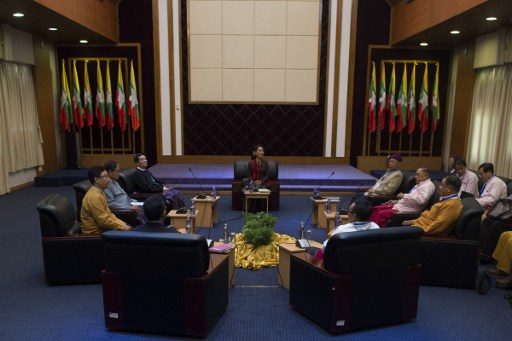SUMMARY
This is AI generated summarization, which may have errors. For context, always refer to the full article.

YANGON, Myanmar – Myanmar’s de facto premier Aung San Suu Kyi held landmark talks with senior rebel leaders on Sunday, July 17, as she strives to seal a ceasefire with a patchwork of ethnic minority militias that have battled the national army for decades.
Suu Kyi has made peace a flagship policy of her newly installed civilian-led government which replaced decades of brutal junta rule earlier this year.
It is a tall order in a country where the military, which is loathed and deeply distrusted by many ethnic rebel groups, still retains significant control.
A number of key rebel factions have yet to sign up to a national ceasefire agreement, something Suu Kyi’s government hopes Sunday’s talks might change.
Zaw Htay, deputy director general of the president’s office, told reporters the veteran democracy campaigner and her close associates were meeting with 5 leaders from the United Nationalities Federal Council.
The body represents both rebel groups that have signed up to the ceasefire agreement and those who have so far refused.
“It will be like meeting family,” he told reporters ahead of the meeting.
Among those present was General N’Ban La, from the Kachin Independence Organisation, the political wing of one of Myanmar’s most powerful rebel factions, which has yet to sign a ceasefire.
“It’s a confidence building meeting, there can be many questions and answers from both sides,” Hla Maung Shwe, a government advisor on the peace process told AFP.
Media were ushered out after filming the initial greetings ahead of the meeting in the commercial capital Yangon.
Myanmar has been scarred by ethnic conflicts ever since its independence in 1948, with minority groups battling for greater autonomy against a central government that they believed has long ignored and abused them.
Suu Kyi has vowed to overturn that painful legacy with plans to hold a major peace conference later this summer.
However, conflicts continue to rage in several areas between ethnic minority armed groups and the army, which operates beyond the reaches of civilian government, particularly in northern Kachin and eastern Shan states.
Some 240,000 people are displaced due to unrest and communal conflict across the country.
More than a dozen rebel factions also plan to hold their own talks later this month in Kachin, with Sunday’s meeting seen as a crucial stepping stone towards persuading the hold-out groups to embrace the peace process.
Both Myanmar’s military and rebel groups have a long history of rights violations linked to decades of conflict, including the use of child labor and drug trafficking.
Suu Kyi’s National League for Democracy government has spoken out in favor of greater federalism for Myanmar’s ethnic minorities.
But her hands are partially tied.
Under Myanmar’s junta-era constitution, the crucial interior, home, and border ministries are still controlled by the army, giving the generals huge sway over whether the peace process is a success. – Rappler.com
Add a comment
How does this make you feel?





There are no comments yet. Add your comment to start the conversation.